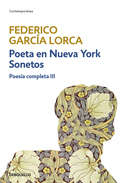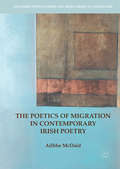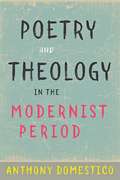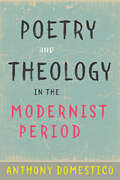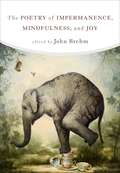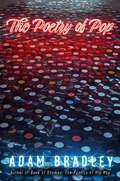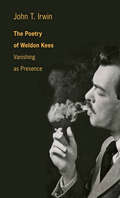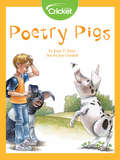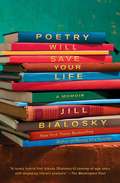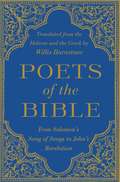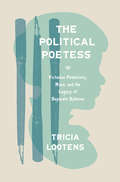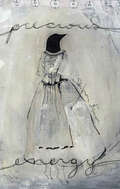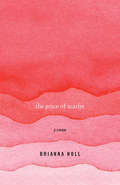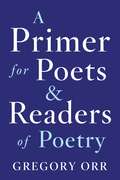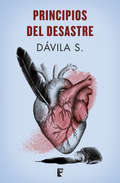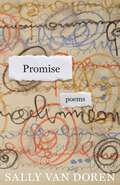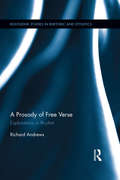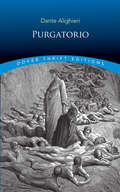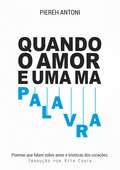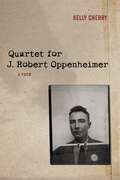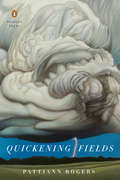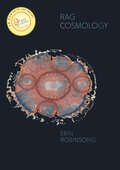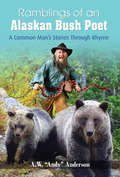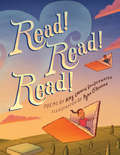- Table View
- List View
Poeta en Nueva York | Sonetos (Poesía completa #3)
by Federico García LorcaPoeta en Nueva York | Sonetos es el tercer volumen de la Biblioteca Federico García Lorca y el tercero de los que compilan su «Poesía completa». En este libro, amén del impresionante poemario Poeta en Nueva York, se presentan las obras Tierra y luna, los Poemas sueltos II y III, Poemas en prosa, Diván de Tamarit, Sonetos, Seis poemas galegos y el Llanto por Ignacio Sánchez Mejías. Asimismo, se ofrecen las conferencias de Un poeta en Nueva York, Cómo canta una ciudad de noviembre a noviembre y el Ensayo o poema sobre el toro en España. La edición y los prólogos a cargo de Miguel García-Posada, permiten al lector acercarse a la complejidad de su obra y disfrutar, a lo largo de los siete volúmenes que componen esta Biblioteca Federico García Lorca, de uno de los autores españoles más relevantes del siglo XX. Luis Cernuda escribió...«Por esto te mataron, porque erasverdor en nuestra tierra áriday azul en nuestro oscuro aire.» --------------------------------------------------------------------------BIBLIOTECA FEDERICO GARCÍA LORCA Poesía competa:1. Libro de poemas | Primeras canciones | Canciones2. Romancero gitano | Poema del cante jondo3. Poeta en Nueva York | Sonetos Teatro completo:4. La zapatera prodigiosa | Mariana Pineda5. El público | Así que pasen cinco años6. Bodas de sangre | Yerma7. La casa de Bernarda Alba | Doña Rosita la soltera--------------------------------------------------------------------------
The Poetics of Migration in Contemporary Irish Poetry
by Ailbhe McDaidThis book offers fresh critical interpretation of two of the central tenets of Irish culture - migration and memory. From its starting point with the 'New Irish' generation of poets in the United States during the 1980s and concluding with the technological innovations of 21st-century poetry, this study spans continents, generations, genders and sexualities to reconsider the role of memory and of migration in the work of a range of contemporary Irish poets. Combining sensitive close readings and textual analysis with thorough theoretical application, it sets out the formal, thematic, socio-cultural and literary contexts of migration as an essential aspect of Irish literature. This book is essential reading for literary critics, academics, cultural commentators and students with an interest in contemporary poetry, Irish studies, diaspora studies and memory studies.
Poetry and Theology in the Modernist Period
by Anthony DomesticoIn this book, Domestico reveals how an important strand of modern poetry actually understood itself in and through the central theological questions of the modernist era: What is transcendence, and how can we think and write about it? What is the sacramental act, and how does its wedding of the immanent and the transcendent inform the poetic act? How can we relate kairos (holy time) to chronos (clock time)? Seeking answers to these complex questions, Domestico examines both modernist institutions (the Criterion) and specific works of modern poetry (Eliot’s Four Quartets and Jones’s The Anathemata). The book also traces the contours of what it dubs "theological modernism": a body of poetry that is both theological and modernist. In doing so, this book offers a new literary history of the modernist period, one that attends both to the material circulation of texts and to the broader intellectual currents of the time.
Poetry and Theology in the Modernist Period
by Anthony DomesticoWhat if the religious themes and allusions in modernist poetry are not just metaphors?Following the religious turn in other disciplines, literary critics have emphasized how modernists like Woolf and Joyce were haunted by Christianity’s cultural traces despite their own lack of belief. In Poetry and Theology in the Modernist Period, Anthony Domestico takes a different tack, arguing that modern poets such as T. S. Eliot, W. H. Auden, and David Jones were interested not just in the aesthetic or social implications of religious experience but also in the philosophically rigorous, dogmatic vision put forward by contemporary theology. These poets took seriously the truth claims of Christian theology: for them, religion involved intellectual and emotional assent, doctrinal articulation, and ritual practice. Domestico reveals how an important strand of modern poetry actually understood itself in and through the central theological questions of the modernist era: What is transcendence, and how can we think and write about it? What is the sacramental act, and how does its wedding of the immanent and the transcendent inform the poetic act? How can we relate kairos (holy time) to chronos (clock time)? Seeking answers to these complex questions, Domestico examines both modernist institutions (the Criterion) and specific works of modern poetry (Eliot’s Four Quartets and Jones’s The Anathemata). The book also traces the contours of what it dubs "theological modernism": a body of poetry that is both theological and modernist. In doing so, this book offers a new literary history of the modernist period, one that attends both to the material circulation of texts and to the broader intellectual currents of the time.
Poetry, Modernism, and an Imperfect World
by Sean PryorDiverse modernist poems, far from advertising a capacity to prefigure utopia or save society, understand themselves to be complicit in the unhappiness and injustice of an imperfect or fallen world. Combining analysis of technical devices and aesthetic values with broader accounts of contemporary critical debates, social contexts, and political history, this book offers a formalist argument about how these poems understand themselves and their situation, and a historicist argument about the meanings of their forms. The poetry of the canonical modernists T. S. Eliot, Mina Loy, and Wallace Stevens is placed alongside the poetry of Ford Madox Ford, better known for his novels and his criticism, and the poetry of Joseph Macleod, whose work has been largely forgotten. Focusing on the years from 1914 to 1930, the book offers a new account of a crucial moment in the history of British and American modernism.
The Poetry of Impermanence, Mindfulness, and Joy
by John BrehmOver 125 poetic companions, from Basho to Billy Collins, Saigyo to Shakespeare.The poems expertly gathered here offer all that one might hope for in spiritual companionship: wisdom, compassion, peacefulness, good humor, and the ability to both absorb and express the deepest human emotions of grief and joy. The book includes a short essay on “Mindful Reading” and a meditation on sound from editor John Brehm—helping readers approach the poems from an experiential, non-analytical perspective and enter into the mindful reading of poetry as a kind of meditation. The Poetry of Impermanence, Mindfulness, and Joy offers a wide-ranging collection of 129 ancient and modern poems unlike any other anthology on bookshelves today. It uniquely places Buddhist poets like Han Shan, Tu Fu, Saigyo, Ryokan, Basho, Issa, and others alongside modern Western poets one would not expect to find in such a collection—poets like Wallace Stevens, Robert Frost, Elizabeth Bishop, William Stafford, Denise Levertov, Jack Gilbert, Ellen Bass, Billy Collins, and more. What these poems have in common, no matter whether they are explicitly Buddhist, is that all reflect the essential truths the Buddha articulated 2,500 years ago. The book provides an important poetic complement to the many prose books on mindfulness practice—the poems here both reflect and embody the dharma in ways that can’t be matched by other modes of writing. It’s unique features include an introduction that discusses the themes of impermanence, mindfulness, and joy and explores the relationship between them. Biographical notes place the poets in historical context and offer quotes and anecdotes to help readers learn about the poets’ lives.
The Poetry of Pop
by Adam BradleyA trailblazing exploration of the poetic power of popular songs, from Tin Pan Alley to the Beatles to Beyonc#65533; and beyond. Encompassing a century of recorded music, this pathbreaking book reveals the poetic artistry of popular songs. Pop songs are music first. They also comprise the most widely disseminated poetic expression of our time. Adam Bradley traces the song lyric across musical genres from early twentieth-century Delta blues to mid-century rock 'n' roll to today's hits. George and Ira Gershwin's "Fascinating Rhythm. " The Rolling Stones' "(I Can't Get No) Satisfaction. " Rihanna's "Diamonds. " These songs are united in their exacting attention to the craft of language and sound. Bradley shows that pop music is a poetry that must be heard more than read, uncovering the rhythms, rhymes, and metaphors expressed in the singing voice. At once a work of musical interpretation, cultural analysis, literary criticism, and personal storytelling, this book illustrates how words and music come together to produce compelling poetry, often where we least expect it.
The Poetry of Weldon Kees: Vanishing as Presence
by John T. IrwinA study in how a poet’s corpus is remembered after he vanishes.Weldon Kees is one of those fascinating people of whom you’ve likely never heard. Most intriguingly, he disappeared without a trace on July 18, 1955. Police found his 1954 Plymouth Savoy abandoned on the north side of the Golden Gate Bridge one day later. The keys were still in the ignition. Though Kees had alluded days prior to picking up and moving to Mexico, none of his poetry, art, or criticism has since surfaced either north or south of the Rio Grande. Kees’s vanishing has led critics to compare him to another American modernist poet who met a similar end two decades prior—Hart Crane. In comparison to Crane, Kees is certainly now a more obscure figure. John T. Irwin, however, is not content to allow Kees to fall out of the twentieth-century literary canon. In The Poetry of Weldon Kees, Irwin ties together elements of biography and literary criticism, spurring renewed interest in Kees as both an individual and as a poet. Irwin acts the part of literary detective, following clues left behind by the poet to make sense of Kees’s fascination with death, disappearance, and the lasting interpretation of an artist’s work. Arguing that Kees’s apparent suicide was a carefully plotted final aesthetic act, Irwin uses the poet’s disappearance as a lens through which to detect and interpret the structures, motifs, and images throughout his poems—as the author intended. The first rigorous literary engagement with Weldon Kees’s poetry, this book is an astonishing reassessment of one of the twentieth century’s most gifted writers.
Poetry Pigs
by Joan T. ZeierHow could George write a poem? He wasn't a poet. But then George touches down in the Land of Hogs: Poetry Pig Farm! Pigs William Shakespeare and Emily Dickinson help George learn to become a poet.
Poetry Will Save Your Life: A Memoir
by Jill BialoskyAn unconventional and inventive coming-of-age memoir organized around forty-three remarkable poems by poets such as Robert Frost, Emily Dickinson, Wallace Stevens and Sylvia Plath, from a critically acclaimed New York Times bestselling author and poet.For Jill Bialosky, certain poems stand out like signposts at pivotal moments in a life: the death of a father, adolescence, first love, leaving home, the suicide of a sister, marriage, the birth of a child, the day in New York City the Twin Towers fell. As Bialosky narrates these moments, she illuminates the ways in which particular poems offered insight, compassion, and connection, and shows how poetry can be a blueprint for living. In Poetry Will Save Your Life, Bialosky recalls when she encountered each formative poem, and how its importance and meaning evolved over time, allowing new insights and perceptions to emerge. While Bialosky’s personal stories animate each poem, they touch on many universal experiences, from the awkwardness of girlhood, to crises of faith and identity, from braving a new life in a foreign city to enduring the loss of a loved one, from becoming a parent to growing creatively as a poet and artist. In Poetry Will Save Your Life, Bialosky has crafted an engaging and entirely original examination of a life while celebrating the enduring value of poetry, not as a purely cerebral activity, but as a means of conveying personal experience and as a source of comfort and intimacy. In doing so she brilliantly illustrates the ways in which poetry can be an integral part of life itself and can, in fact, save your life.
Poets of the Bible: From Solomon's Song of Songs to John's Revelation
by Willis Barnstone“The vividness and beauty of the language emerge in a fresh way . . . with evocative simplicity.” —Robert Alter, professor emeritus of Hebrew and comparative literature, University of California, Berkeley The world’s greatest poetry resides in the Bible, yet these major poets are traditionally rendered into prose. In this pioneering volume of biblical poets translated in English, Willis Barnstone restores the lyricism and power of the poets’ voices in both the New and Old Testaments. In the Hebrew Bible we hear Solomon rhapsodize in Song of Songs, David chant in Psalms, God and Job debate in grand rhetoric, and prophet poet Isaiah plead for peace. Jesus speaks in wisdom verse in the Gospel, Paul is a philosopher of love, and John of Patmos roars majestically in Revelation, the Bible’s epic poem. This groundbreaking volume includes every major biblical poem from Genesis and Adam and Eve in the Garden to the last pages of Alpha and Omega in Paradise.
The Political Poetess: Victorian Femininity, Race, and the Legacy of Separate Spheres
by Tricia LootensThe Political Poetess challenges familiar accounts of the figure of the nineteenth-century Poetess, offering new readings of Poetess performance and criticism. In performing the Poetry of Woman, the mythic Poetess has long staked her claims as a creature of “separate spheres”—one exempt from emerging readings of nineteenth-century women’s political poetics. Turning such assumptions on their heads, Tricia Lootens models a nineteenth-century domestic or private sphere whose imaginary, apolitical heart is also the heart of nation and empire, and, as revisionist histories increasingly attest, is traumatized and haunted by histories of slavery. Setting aside late Victorian attempts to forget the unfulfilled, sentimental promises of early antislavery victories, The Political Poetess restores Poetess performances like Julia Ward Howe’s “Battle Hymn of the Republic” and Emma Lazarus’s “The New Colossus” to view—and with them, the vitality of the Black Poetess within African-American public life. Crossing boundaries of nation, period, and discipline to “connect the dots” of Poetess performance, Lootens demonstrates how new histories and ways of reading position poetic texts by Felicia Dorothea Hemans, Elizabeth Barrett Browning, Dinah Mulock Craik, George Eliot, and Frances E. W. Harper as convergence points for larger engagements ranging from Germaine de Staël to G.W.F. Hegel, Virginia Woolf, Elizabeth Bishop, Alice Walker, and beyond.
Precious Energy
by Shannon BramerPrecious Energy, the fourth collection of poetry from Hamilton-born poet and playwright Shannon Bramer, is a uniquely playful collection of vibrantly sad, peculiar, and often funny poems about domestic life, motherhood, and the baffled child that remains within us all even as we grow up and into whatever person we keep trying to become. Featuring a coterie of subjects, from fish sticks and LEGO pieces to mothers too tired to have sex and solitary swans in everyone's basement, these poems dexterously navigate a landscape of domestic isolation, insecure attachments, and confused personal boundaries with honesty and unexpected humour.
The Price of Scarlet: Poems (University Press of Kentucky New Poetry & Prose Series)
by Brianna NollA debut collection of poetry combining the scientific and the fantastic with Japanese culture. A honeycomb long vacated by honeybees still possesses an &“echo of the swarm, / a lingering song.&” Living things are made and make themselves: &“My bones came first. / Like long needles, / they knitted muscle / and tendon / and tissue and skin. / Filled themselves / with marrow.&” In her debut collection, Brianna Noll fuses the scientific and fantastic, posing probing questions that explore the paradoxes of experience. Interweaving themes of creation, art, and nature, the poet gives voice to animate and inanimate figures such as woolly mammoths, star-nosed moles, cells, mylar balloons, and puzzle boxes. Her vivid poems obscure the line between what is literal and what is figurative. The result is alchemic and ethereal—each verse intricately layered with sharp observation as well as emotional and intellectual exploration and questioning. Collectively, the poems draw significantly on Japanese culture and language in their imagery, with cultural nuances and implications embedded in words and expressions. They tend to be tied, not to subjects, but to ways of seeing and considering the world. Noll&’s lyrical voice reflects a curious and imaginative approach that results in tight poems, typically enjambed, which build together into a thoughtful collection. Her work offers ways of seeing and considering the world that exceed our lived experience, begging the reader to consider how far we are willing to go when faced with roadblocks, doubts, and uncertainties.Named one of the best books of 2017 by the Chicago Review of Books Praise for The Price of Scarlet &“Brianna Noll&’s vivid, haunting collection contains poetry wide-ranging and deep, with a brilliance reminiscent of Marianne Moore, and a similar interest in creation.&” ―Lisa Williams, author of Women Reading to the Sea and Gazelle in the House "Brianna Noll is on the find-out committee. Like an Emily Dickinson for the twenty-first century, she rules out nothing. These quiet, powerful poems tells us that the world is connected, that all we need to see those connections is what Noll has in abundance: openness, patience, and an eye for beauty.&” ―David Kirby, author of Get Up, Please &“The Price of Scarlet doesn&’t sneak up on the reader as much as it swallows the reader whole, pushes us out at the other end, more erudite than upon entrance. There&’s a certainty in every poem, whether she is investigating the nature of the wind or invoking the Kraken from the deep. This is a remarkable first book of poems. From the first poem to the last these solid poems feel polished to a fine gloss. Read The Price of Scarlet, it will intoxicate you.&” ―Today's Book of Poetry
A Primer for Poets and Readers of Poetry
by Gregory OrrAn innovative and accessible guide to poetry-writing by an award-winning poet and beloved professor of poetry. A Primer for Poets and Readers of Poetry guides the young poet toward a deeper understanding of how poetry can function in his or her life, while also introducing the art in an exciting new way. Using such poems as Theodore Roethke’s "My Papa’s Waltz" and Robert Hayden’s "Those Winter Sundays," the Primer encourages young writers to approach their "thresholds"—those places where disorder meets order, where shaping imagination can turn language into urgent and persuasive poems. It provides the poet with more than a dozen focused writing exercises and explains essential topics such as the personal and cultural threshold; the four forces that animate poetic language (naming, singing, saying, imagining); tactics of revision; ecstasy and engagement as motives for poetry; and how to locate and learn from our personal poetic forebears.
Principios del desastre
by Dávila S.Principios del desastre es el primer libro de poemas de Dávila S. Luces y sombras Tus ojos son esos orbesverdes que parpadeanen medio de la noche,deslumbrando las acerasy los cielos,mostrando ese suspirode luz que te define. ¿Podrá mi oscuridadluchar contra el vacíode tenerte sin tenerte,sin ser mío el tiemposuficiente, en estos ojostuyos que hoy me entienden? Tus labios parecensaber todas las respuestas.
Promise: Poems
by Sally Van DorenSally Van Doren’s Promise features a series of short lyric poems, contemplative vignettes of daily life that examine friendship, marriage, and family with a veneer of playfulness. These poems take us into a space where a year is compressed into minutes and a small trickle of memory floods the mind. Van Doren, a visual artist as well as a poet, composes word collages that help us to touch the promise underneath the surface and to make sense of the senseless.
A Prosody of Free Verse: Explorations in Rhythm (Routledge Studies in Rhetoric and Stylistics)
by Richard AndrewsThere is to date no comprehensive account of the rhythms of free verse. The main purpose of A Prosody of Free Verse: explorations in rhythm is to fill that gap and begin to provide a systematic approach to describing and analyzing free verse rhythms. Most studies have declared the attempt to write such a prosody as impossible: they prefer to see free verse as an aberrant version of regular metrical verse. They also believe that behind free verse is the ‘ghost of metre’. Running against that current, A Prosody of Free Verse bases its new system on additive rhythms that do not fit conventional time signatures. Inspiration is taken from jazz, contemporary music and dance, not only in their systems of notation but in performance. The book argues that twentieth and twenty-first century rhythms in poetry as based on the line rather than the metrical foot as the unit of rhythm , and that larger rhythmic structures fall into verse paragraphs rather than stanzas.
Purgatorio (Dover Thrift Editions: Poetry Ser.)
by Dante Alighieri Henry Wadsworth LongfellowThe second book in the three-part Divine Comedy finds Dante and his guide, Virgil, halfway between Heaven and Hell. Having portrayed the tortures of the damned in Inferno, Dante resumes his allegory of the soul's journey to God with Purgatorio. A place of pain but also hope, Purgatory allows its suffering souls to reflect upon their sins and to work toward their moral improvement, paving the way for their eventual entry to Paradiso.Dante transformed the traditional notion of Purgatory by depicting how aspiring souls could undergo moral change, exchanging their human frailty for divine perfection. His exploration of theological issues, especially the role of free will, offers an eloquent and inspiring parable of human possibility and redemption. This edition features the renowned translation by American poet Henry Wadsworth Longfellow and serves as a companion volume to the Dover editions of Inferno and Paradiso.
Quando o Amor é uma má palavra
by Piereh Antoni Rita Isabel Ribeiro da Costa> - Rita Costa << "Quando o amor é uma má palavra" é uma antologia poética que reune setenta e cinco expressões de sentimento escritas por mim desde o ínicio do ano de 2008. Em "Quando o Amor é uma má palavra" personifiquei diversas situações, reais ou imaginárias. Minha única intenção é que o leitor seja transportado para um mundo de muitas histórias, no qual terá toda a liberdade para interpretá-las. As palavras incluídas em cada uma desta "folhas" não pretendem discriminar. Estão ordenadas da mesma forma que o amor, com picos e abismos, quando começa, quando se cruza com a desilusão e dor, quando termina com o desejo de renascer e tentar uma vez mais. Então, o melhor é deixar que elas mesmas se apresentem com a sua histórias.>> - Piereh Antoni
Quartet for J. Robert Oppenheimer: A Poem
by Kelly Cherry“Robert Oppenheimer was a complex human being. No biography yet written comes even close to this elegant skein of poems in capturing his life and character.”—Richard Rhodes, author of the Pulitzer Prize–winning The Making of the Atomic Bomb Quartet for J. Robert Oppenheimer records in poetry the life and times of one of America’s best-known scientists, the father of the atomic bomb who later lobbied for containment of nuclear weaponry. In brief, elegant stanzas, Kelly Cherry examines Oppenheimer’s inspirations, dreams, and values, visiting the events, places, and people that inspired him or led him to despair. She finds his place among scientists of his own time, such as Alan Turing and Albert Einstein, as well as his connections with historical and mythological figures from John Donne to Persephone. “Of course he had blood on his hands. Who did not?” says Cherry, in “The Nature of War.” Again and again in the course of this remarkable poem, Cherry’s narration of Oppenheimer’s life compels her readers to contemplate the vagaries of science, guilt, and our responsibilities to each other. “Quartet for J. Robert Oppenheimer is a book length poem in which the architect of the atom bomb comes to embody America and the West’s Faustian control of nature and the paradoxical helplessness and guilt which that control entailed. Oppenheim is marvelous, complicated, flawed and admirable character, and these poems read like chapters in a novel without in any way abandoning the intensities of feeling and image or delight in language we associate with lyric poetry. A terrific achievement and a compelling read.”—Alan Shapiro, author of Life Pig and Reel to Reel
Quickening Fields
by Pattiann RogersA new collection by an award-winning poet who “presents her apprehensions of the natural world with striking accuracy and emotional impact” (Orion Magazine)Denise Levertov has called Pattiann Rogers a “visionary of reality, perceiving the material world with such intensity of response that impulse, intention, meaning, interconnections beyond the skin of appearance are revealed.” Quickening Fields gathers fifty-three poems that focus on the wide variety of life forms present on earth and their unceasing zeal to exist, their constant “push against the beyond” and the human experience among these lives. Whether a glassy filament of flying insect, a spiny spider crab, a swath of switch grass, barking short-eared owls, screeching coyotes, or racing rat-tailed sperm, all are testifying to their complete devotion to being. Many of the poems also address celestial phenomena, the vision of the earth immersed in a dynamic cosmic milieu and the effects of this vision on the human spirit. While primarily lyrical and celebratory in tone, these poems acknowledge, as well, the terror, suffering, and unpredictability of the human condition.
Rag Cosmology
by Erin RobinsongWinner of the 2017 A.M. Klein Prize for Poetry BookThug is proud to introduce a groundbreaking debut collection of poems by Erin Robinsong. In this time of ecological precarity, Rag Cosmology is an urgent invitation to reinvent our modes engagement with the environment we not only inhabit, but are. Refusing the lamentation that leaves us as resigned witnesses to devastation, Rag Cosmology counters fatalist narratives with the pleasures of ecological entanglement and engagement. Tracing relationships between seemingly irreconcilable things--economy and ecology, weather and lust, bills and inner voices, wages of avoidance and wages of listening--Rag Cosmology offers the intimate and lush language of thought that yearns for an imaginative reinvention of how we understand what we are part of and what we are losing.
Ramblings of Alaskan Bush Poet: A Common Man's Stories Through Rhyme
by Andy AndersonI've held a myriad of jobs in the more than 53 years I've made Alaska, the Great Land, my home. Varieties of employment, along with my other life experiences, have given me an interesting and exciting existence. My experiences have been educational, some frightening, some life threatening, some humorous, some heartbreaking, but all played a part in preparing me for the writing of Ramblings of an Alaskan Bush Poet. I'm hopeful my backstories will put the reader in somewhat the same mind set, or emotion, I was experiencing at the time. When readers discuss my work I hope to be viewed as a common man who tells his stories through rhyme and, at the same time, someone who paints a vivid picture of what my limericks convey.
Read! Read! Read!: Journey To The West (Penguin Active Reading (graded Readers) Series)
by Amy Ludwig VanderwaterTwenty-three poems capture the joys of reading. From that thrilling moment when a child first learns to decipher words, to the excitement that follows in reading everything from road signs to field guides to internet articles to stories, these poems celebrate reading. They also explore what reading does -- how it opens minds, can make you kind, and allows you to explore the whole world. Ryan O’Rourke’s rich artwork beautifully captures the imagination and playfulness in these poems by noted author Amy Ludwig VanDerwater.
